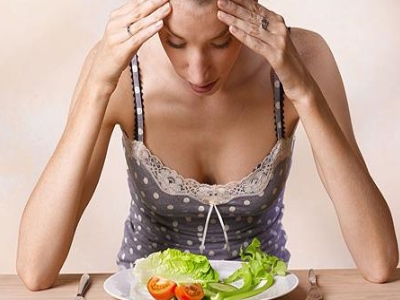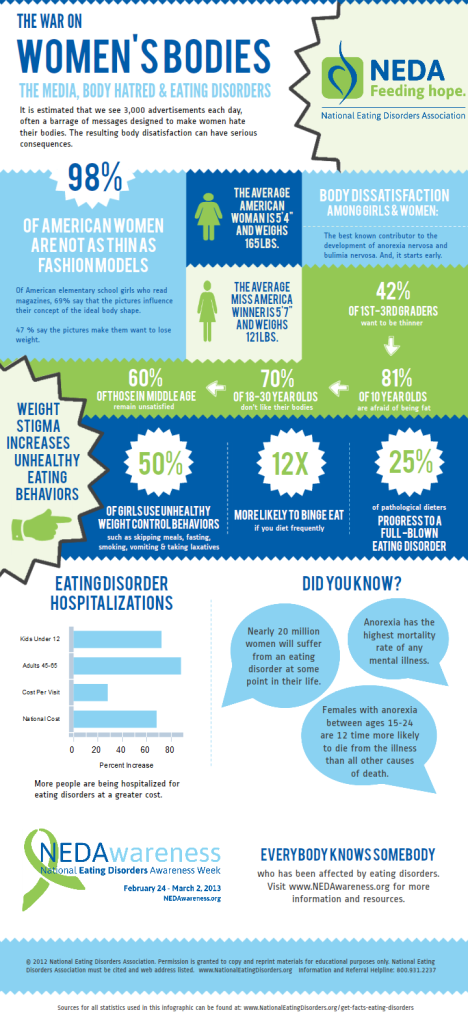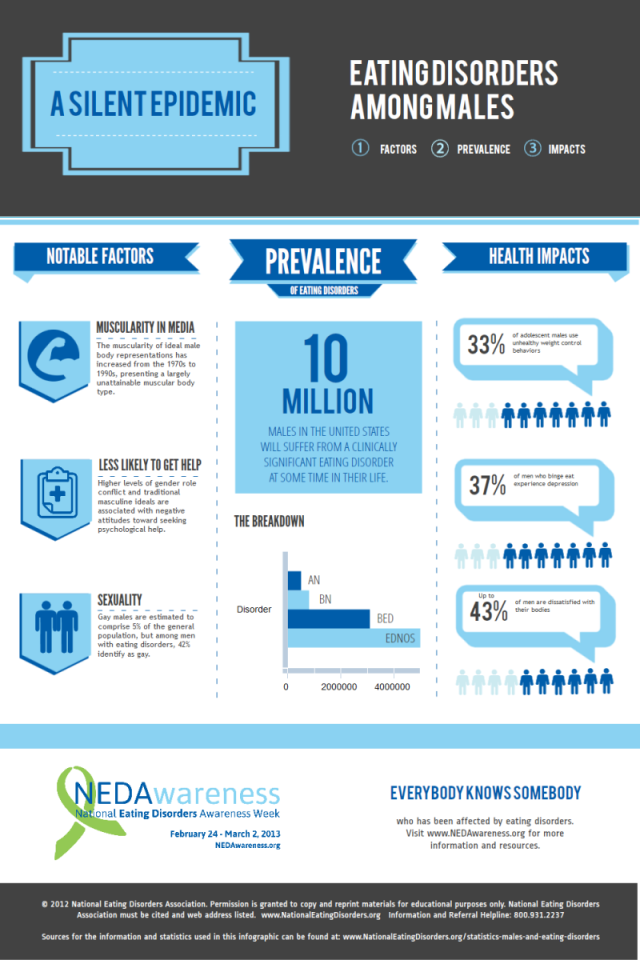Upon hearing the words “eating disorder,” it’s likely the images of an emaciated woman refusing food or another taking frequent trips to the bathroom to throw up are conjured.
We’re familiar with anorexia nervosa and bulimia through films, television shows, health class, or magazines. Modern technology now provides a new platform for these diseases with the creation of sites and profiles dedicated to ‘Anas,’ ‘Mias,’ and thinspiration ideals. Just do a quick search of these terms with a hashtag on Twitter and you’ll see endless pages expressing the war with food out of a desperate need to be thin, raging daily.
You may know someone personally who’s facing their own battle with eating disorders and struggle with the obsessive addiction to be thin. Or maybe you’ve been down this road yourself.
However you’ve encountered eating disorders (ED) in the past, most people have heard of anorexia, bulimia, and binge eating in some context. Given the overwhelming statistics of ED related health concerns and the media coverage utilized to help educate the public about these disorders, its become part of our modern social discourse. Despite that awareness, many people become afflicted with anxiety and some form of disordered eating, especially within our environment that often provides conflicting ideas about food and health.
There are eating disorders aside from anorexia and bulemia that are relatively unknown but share the same foundation of obsessive control of food for the purposes of weight loss or management to the point of addiction. I had my eyes opened forcefully late last year when I discovered one form of ED that I’d never heard of before but would never forget: orthorexia.
I recently told a story about my experiment with the Paleo diet and how it triggered some of my negative behavior with food that I thought I’d overcome. It was during this time that I discovered orthorexia.
I was at work going through my news feed and came across this article from Runner’s World that grabbed my attention. It spoke about how a fixation on eating healthy, organic foods can sometimes cross a line when you become obsessed with the need to be absolutely “pure” in all of your food choices. I felt that the description of this disorder fit me like a glove, and so I did what I normally do while reading health articles: I self-diagnose and freak out.
Everything about this disorder seemed to make sense to me since I was in the throes of a diet crisis that hadn’t even reached its peak yet. My breakdown wasn’t due for a couple of months, but I’d already sensed something was off in my gut.
The idea that you could take something perfectly healthy like eliminating processed foods from your diet or reducing your sugar intake and pervert it by ruthlessly examining every item of food that crosses your lips to determine if it passes your own high standard of healthiness didn’t seem far-fetched to me. It’s this kind of obsessive analysis that goes on in my mind all of the time about everything, especially food when I don’t keep it in check, which I wasn’t last year.
I think what eventually forced me to admit that something was wrong was my level of anxiety. I couldn’t just get home and throw dinner together or quickly pick up lunch during the day. I had to painstakingly plan my meals out ahead of time and think through each item on my grocery list to see if it passed my personal ‘approved list’ of foods that I could eat. What was supposed to be a simple diet turned into a nightmarish process. And worse yet, I’d still experience guilt if I wasn’t committed 100% of the time or ‘cheated’ on one meal. How could I not see the similarities?

According to the Academy of Nutrition and Dietetics, orthorexia nervosa is an unhealthy obsession with healthy eating to the point that ‘purity’ becomes the goal and foods deemed impure are completely eliminated. The emphasis is more on quality than quantity and orthorexics go to extreme lengths to fiercely maintain a diet as natural and clean as possible.
Our nation is in the midst of a national health crisis with regard to the rates obesity and its associated health risks that constantly play out in the media on a daily basis. The focus on leading healthy lifestyles along with a movement towards going green with organic products and cutting out processed foods to be replaced by natural, all blend together to create a perfect storm for those susceptible to obsessive behaviors surrounding food. The sad irony is that in an effort to embrace a positive lifestyle change, some adopt worse habits that can be devastating and difficult to overcome.
Erin Sund wrote about orthorexia for AND and spoke with Dr. Marjorie Nolan about the disorder:
“Orthorexia starts out with a true intention of wanting to be healthier, but it’s taken to an extreme,” says Academy of Nutrition and Dietetics Spokesperson Marjorie Nolan, MS, RD, CDN, ACSM-HFS, who specializes in working with eating disorder clients. “If someone is orthorexic, they typically avoid anything processed, like white flour or sugar. A food is virtually untouchable unless it’s certified organic or a whole food. Even something like whole-grain bread – which is a very healthy, high-fiber food – is off limits because it’s been processed in some way.”
Although orthorexia is not officially recognized by the DSM (Diagnostic and Statistical Manual of Mental Disorders), it is quickly becoming accepted as a new form of disordered eating that has similar effects on both the physical and mental health of those afflicted as anorexia and bulimia.
I am not a licensed professional nor a registered member of the APA or the AND. But I am an expert in me and what I’ve gone through personally with relation to food, and the point here is that any kind of obsessive behavior where you’re spending more time thinking about the food and its components and less time actually enjoying the meal, is not a good thing.
Initially, I found the very existence of a term that described my food issues satisfying with an immediate sense of relief as if I’d been “figured out.” There’s a name to what I’ve been experiencing and that makes all of this okay, I thought.
The fact is, no it really doesn’t make it okay. Giving it a name helps bring it out of the closet and raises awareness to others out there who might not realize that its unhealthy to be so excruciatingly detailed in their thought process about what’s on their plates. But that’s just step one and it’s harder to land on step two.
I don’t know if I’m orthorexic or if anything I’m going through qualifies as a classifiable disorder and really, I couldn’t care less. Tagging it as one thing or another doesn’t take away from the fact that I still have too many thoughts about food which make some decisions that are simple for others much harder for me. I don’t know why. I couldn’t tell you, but that’s where I am.
I’ve made a commitment to leading a healthy lifestyle and I believe I’m capable of approaching food with a positive frame of mind. What makes a difference for me is allowing myself to speak openly about my challenges and shed light on those dark corners so that I can stay on the right side of the line. I don’t think having a passion for healthy eating and living is a bad thing and it’s something I’m continually trying to understand each day.
The benefit I found from discovering orthorexia is that it opened my eyes to the negative habits I developed and it helped me begin a process of forgiveness and healing. I was able to acknowledge that it was real and that I wasn’t the only one with this kind of pressure. It’s all about choices and being honest with yourself about your intentions. That’s the power of knowledge and that’s my goal with this blog.
In an effort to keep that going and to share information that I think is vital for everyone to know, here is an infographic created by the non-profit National Eating Disorders Association who recently sponsored National Eating Disorders week February 24 through March 2nd. It was a massive campaign to help educate the public on the impact of eating disorders and learn more about services available for those in need of support and professional help. The National Association of Anorexia Nervosa and Associated Disorders (ANAD) is another amazing resource if you’d like more information.


I am always staggered by the statistics for ED. It reminds me that these disorders afflict people of all backgrounds, races, and genders. Shed any limited thoughts you might have about the face of ED and consider that it’s an issue that affects people from so many different walks of life.
Have you experienced similar anxiety about food and healthy eating? What do you think about classifying orthorexia as an eating disorder and treating it as a disease? Share your thoughts! I’m curious.
Remember to keep paying it forward, now and always. ❤

Such important information and reminder that “healthy eating” is actually disordered eating is disguise. I think the bottom line is that any extreme is worth examining. Especially where there is anxiety and obsessive behavior. Because all disorders begin with that obsessive behavior in our minds. Thank you for sharing this important information as well as a little part of your own journey.
LikeLike
YW and thank you for reading and sharing with your network. It’s an awkward and challenging issue to write about and its something I still struggle to find the right words to describe. Even now I’m second-guessing this post and how I got it out there. It’s that over-analytical side of me that never shuts up! But I’m glad its out and that at the very least, there’s useful information available to anyone who might need it or is interested in learning more. Thanks again Ilene for all of your support!
LikeLike
This was an awesome post, thank you!
LikeLike
Thank you Megan for reading and for your compliment! 🙂
LikeLike
Interesting. It doesn’t surprised me that it classifies as a disorder, because at some point it doesn’t become an issue of the food, but an issue of our control over it. And there are usually other things behind that obsession. I think we can be health conscious and have a healthy relationship with food without going to that extreme. (Says me, struggling with food issues right this very second.)
LikeLike
Exactly right- it boils down to control and whatever the source of the anxiety is. It’s such a grey area with something like orthorexia because I agree that we can be health conscious without having to put all of our choices under a microscope. The point is how far do you take it, which I suppose is why I sat down to write this post, because I tend to take things too far sometimes. Food issues are so challenging!! TY for stopping by!
LikeLike
Great info! Thanks for sharing! 🙂
LikeLike
NP, thank you for stopping by! 🙂
LikeLike
Omg! This is such a great post! I never thought “healthy eating” could be an eating disorder I always felt it was such a great quality to have but this all makes sense! I am a little shocked, to be honest, and I wish the media and our schools would focus on this eating disorder as well.
LikeLike